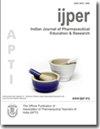Design and Application of the Blended Teaching Mode in the Curriculum of Pharmacokinetics
IF 0.8
4区 医学
Q3 EDUCATION, SCIENTIFIC DISCIPLINES
Indian Journal of Pharmaceutical Education and Research
Pub Date : 2023-10-04
DOI:10.5530/ijper.57.4.141
引用次数: 0
Abstract
Abstract: Introduction: Pharmacokinetics is one of the main courses of pharmacy majors in medical colleges and universities. The course is highly practical involving multidisciplinary collaboration, with strong logical reasoning and complex calculations. But the widespread traditional teaching methods resulted in poor practical application ability, self-learning ability, and problem-solving ability of students. Objectives: To enhance the students' knowledge and problem-solving ability, we focused on the curriculum reform of pharmacokinetics. Materials and Methods: It was based on the online and offline mixed teaching mode including revising the training program and syllabus, reconstructing the teaching staff, constructing online courses, designing class teaching, and careful teaching implementation, and construction of evaluation system. Finally, questionnaire survey was conducted to evaluate the implementation effect about the "online + offline" hybrid teaching mode. Results: It showed that the mixed online and offline teaching mode can help to solve the problem of difficulty in both teaching and learning the pharmacodynamics course. It changed the students' rigid learning methods that are not conducive to the cultivation of applied high-quality pharmaceutical talents. Moreover, this teaching reform enhanced the students' problem-solving ability. It achieved the course goals of cultivating students to be competent in medication guidance, drug quality control, and supervision positions, and to have the basic ideas and abilities to innovatively research and solve drug quality problems. Conclusion: This blended teaching mode may be an effective alternative to conventional approaches in pharmaceutical education. Keywords: Curriculum, Blended teaching mode, Pharmacokinetics, Pharmaceutical students.药物动力学课程混合式教学模式的设计与应用
摘要:《药代动力学》是医学院校药学专业的主干课程之一。本课程实践性强,涉及多学科合作,逻辑推理能力强,计算复杂。但传统的教学方法普遍存在,导致学生的实际应用能力、自学能力和解决问题的能力较差。目的:重点开展药代动力学课程改革,提高学生的知识水平和解决问题的能力。材料与方法:基于线上线下混合教学模式,包括修改培训计划和教学大纲,重构师资队伍,构建在线课程,设计课堂教学,精心教学实施,构建评价体系。最后通过问卷调查对“线上+线下”混合教学模式的实施效果进行评价。结果:线上线下混合教学模式有助于解决药效学课程教与学难的问题。改变了学生僵化的学习方式,不利于应用型高素质药学人才的培养。此外,这次教学改革提高了学生解决问题的能力。达到了培养能胜任用药指导、药品质量管理和监督岗位的学生,具有创新性研究和解决药品质量问题的基本思路和能力的课程目标。结论:这种混合教学模式可作为常规教学模式的有效替代。关键词:课程;混合式教学模式;药代动力学;
本文章由计算机程序翻译,如有差异,请以英文原文为准。
求助全文
约1分钟内获得全文
求助全文
来源期刊
CiteScore
1.40
自引率
0.00%
发文量
227
审稿时长
>12 weeks
期刊介绍:
The official journal of Association of Pharmaceutical Teachers of India (APTI) and is being published since 1967. IJPER, a quarterly publication devoted to publish reviews and research articles in pharmacy and the related disciplines of Pharmaceutical education. It mainly covers the articles of special interest, covering the areas of Pharmaceutical research, teaching and learning, laboratory innovations, education technology, curriculum design, examination reforms, training and other related issues. It encourages debates and discussions on the issues of vital importance to Pharmaceutical education and research. The goal of the journal is to provide the quality publications and publish most important research and review articles in the field of drug development and pharmaceutical education. It is circulated and referred by more than 6000 teachers, 40,000 students and over 1000 professionals working in Pharmaceutical industries, Regulatory departments, hospitals etc.

 求助内容:
求助内容: 应助结果提醒方式:
应助结果提醒方式:


